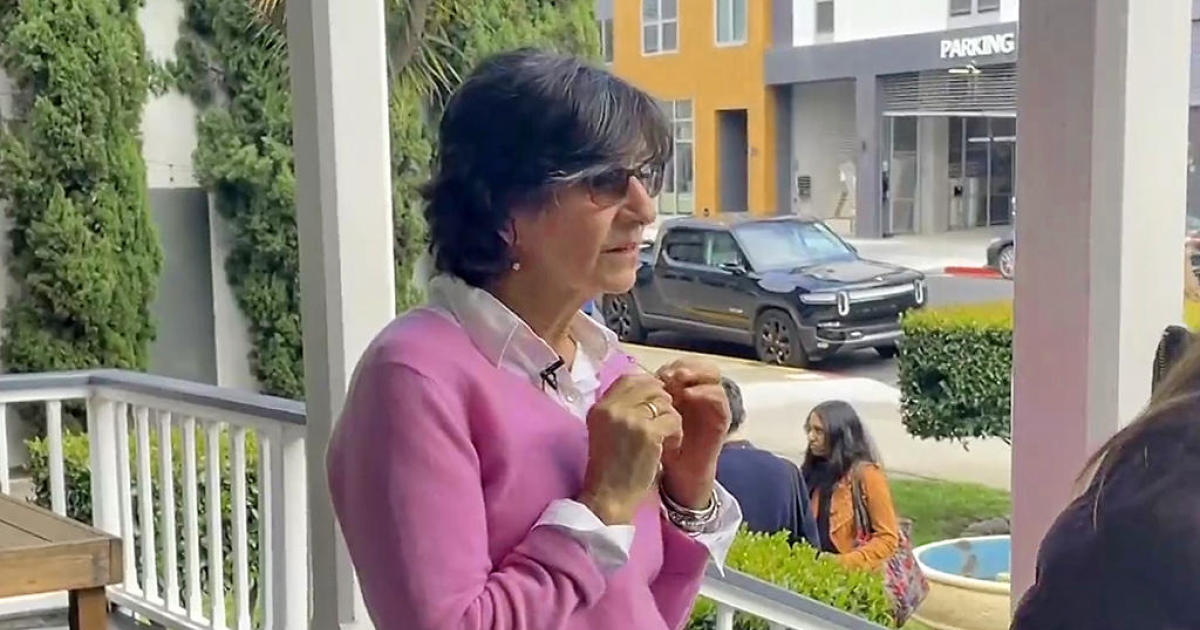KCBS Cover Story - The Sahara Ceiling: Women Of The Last World
WEST AFRICA (CBS SF) – Revolutions across Africa promise new freedom, but much of the continent is still reeling from civil war and famine. And the treatment of women remains a critical concern, especially as more governments come under Islamic control.
In this KCBS cover story "The Sahara Ceiling: Women of the Last World," reporter Doug Sovern travels across West Africa, looking at the treatment and status of women in Africa during this time of upheaval.
KCBS' Doug Sovern Reports:
From the Atlantic to the Sahara, the 16 countries of West Africa constitute some of the poorest places on Earth. Civil wars have ravaged Liberia, Cote d'Ivoire and Sierra Leone. And it's an especially harsh place for women and children.
"We are in a region with the highest rate of maternal and infant child mortality in the world," said Christian Fung of San Francisco, the United States' regional health director for 25 countries in West and Central Africa. "The lowest level usage of contraceptives and the highest rate of unmet needs."
Fung said he knows the numbers can be mind-numbing in an area so poor that it's sometimes referred to not as third world, but as the "Last World."
"We are talking about actual people's lives, who are not getting any better, year-after-year, decade-after-decade," he said.
That includes some of the people in Pikine, a dense slum in Senegal, where the mayor, through an interpreter, talks about his people's hardship. "There is no sanitation, no good roads, there are no resources here," he said. "People are very, very poor."
While her children learn the Koran in a classroom with 80 kids and one teacher, a beleaguered Pikine mother laments, through an interpreter, that she can't afford to buy them medicine or food. "We are a poor country and this is the poorest city in the country," she said. "Life is very hard. I do not have enough money to feed my children. There are too many children, but what can we do? I don't want to have anymore children."
But there's little access to health care, especially in areas torn by conflict, such as western Cote d'Ivoire, where Suzanne Konate with the United Nations Population Fund said war has wiped out the medical infrastructure. "52 percent of the health center was destroyed and the needs are huge," Konate said.
An Ivoirian woman shares her story, that in another language, you might also hear in Nigeria, Somalia or Kenya. "The conditions for us are very difficult. We have war, we have fighting. Men come and go and they disturb me," she said. "It is very hard to maintain my family and care for my children. We need food, someplace to live and money. We just struggle to survive. Women are raped, they get pregnant and the government and soldiers do not care. We must take care of ourselves and this is not easy."
Sexual violence is largely underreported in Africa and when many women do go to the police, they are often punished, even forced to marry their rapist or worse, bear their children. "The only thing that I think is worse for women than being raped is to be raped and be pregnant," said Malcolm Potts, Bixby Professor of Population and Family Planning at UC Berkeley.
Potts, who works in Liberia, said he's a strong advocate of offering abortions to rape victims, even where that is not legal. "Even people who feel very strongly about abortion, I respect them," Potts said. "I'm not going to get in the way when you offer a woman who has been raped a safe abortion. I think that every woman on this planet would wish that for themselves and we should not be afraid to respect women and give them that choice."
Potts said that doctors shouldn't worry about getting in trouble for helping victims of sexual violence. "If a country doesn't prosecute the rapists, why should we punish the women by not offering them abortions? There are simply human exceptions that tug at everybody's heart."
Not everyone as West Africa is mostly Muslim, and the local imams don't agree with Professor Potts. At a mosque in Pikine, Senegal, the country's most powerful imams gather to pray. Islamic leaders, through interpreters, said they now embrace letting women use contraceptives to try to slow Africa's population explosion. "It took us time to really understand that. Islam is not actually against family planning."
But when abortion is brought up, there are gasps of shock in the mosque. The imam said abortion is only allowed to save the life of the mother. "Islam is against abortion," he said. With no exceptions for rape or incest.
The imams also said that the West still doesn't understand Islam and shouldn't fear its spread, as military dictatorships fall across Africa and the people elect Muslim-led governments to replace them. "Islam is a religion that is only for peace. It is just for the benefit of human beings and for people to benefit from all the good things nature has to offer," the imam said. "It is not a wicked religion. It is a religion of peace."
But when the senior imam is challenged again, this time about terrorism and war waged in the name of Islam, he is adamant. "Those people you see placing bombs, attacking other people, spreading terror. They call themselves Muslims. But they are not Muslims at all. We are true and peaceful Muslims."
As their religious leaders lift restrictions on family planning, if not abortion, more Senegalese women seek counseling and medical treatment. But the local hospital is understaffed and short on supplies. "The hospital is not well-equipped. In terms of human resources, they are not always well-staffed," said a doctor. The doctor in charge said 15 to 20 babies are born at the hospital each day, with their mothers coming in at the last moment. "They haven't been taken care of appropriately. There is no prenatal care."
28-year-old Fanta, a mother of four, arrives at the hospital, curious about birth control. "I don't want to have another pregnancy. I have four babies," she said. "I don't want to have another baby." But she keeps the visit a secret from her husband. "You can do it without your husband knowing. If you don't tell your friends, nobody would know."
Services are scarce enough where there is peace, but in areas with active conflict, they become almost non-existent according to Adrian Testa, an international women's health researcher working in Uganda. "Where there's a lot of uncertainty and chaos, that's completely exacerbated. In terms of access, facilities will fall apart," Testa said. "They're really doubly disadvantaged."
Ouagadougou, Burkina Faso is the third least developed nation in the world. While Senegal is ending female genital mutilation, in Ouagadougou, Burkina Faso, women are still circumcised, with the rate at 72 percent. Suzanne Konate, who has worked in half a dozen West African countries, said the secondary status of women is still the biggest barrier to development. She said lifting it starts with access to schooling and health care.
"We need more empowerment for women so they can decide to go to the health center and benefit from good services," said Konate. "And also to decide for their own body, not just to be at home with child after child after child." A rarity in West African professional ranks dominated by men, Konate said she broke through the "Sahara Ceiling" by getting an education. Now, she's determined to raise up the women of Africa. "I will continue until I die because we should help our sisters so that they can better understand they can save their own life."
Christian Fung said the world brings money to Africa, but not empathy. "We still view the beneficiaries as 'the others.' Almost like we're viewing little puppies. They're neat and they're cute and let's play with them awhile and then put them down and go and turn around," said Fung. "We have to do something different to create a framework and thinking and approach to how we're doing humanitarian assistance."
Konate said they are making progress, but there is still plenty more that can be done.
(Copyright 2011 by CBS San Francisco. All Rights Reserved. This material may not be published, broadcast, rewritten, or redistributed.)



